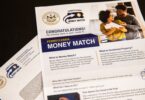Provided by the Bucks County Department of Consumer Protection:

It’s that sometimes dreaded time of year again, tax filing season! It seems as though every year there’s an ever growing list of tax related scams to be aware of. The Bucks County Crimes Against Elder Adults would like to warn not just seniors but all Bucks County residents of some of the red flags to be aware of related to tax scams. The Internal Revenue Service has also been proactive in providing tips and alerts on their website www.irs.gov warning taxpayers of some common tax related scams to avoid.
The information in your tax return contains everything that a scam artist needs to steal your identity, file tax returns on your behalf, or even steal your refund. Be vigilant and never provide any sensitive information over the telephone. Many of us are aware of the scam calls claiming to be from the IRS and telling consumers they’ll be arrested if they don’t submit payment over the phone via gift cards. The IRS will never make contact in this manner nor will they ever ask you to pay a tax debt by wiring the money or purchasing gift cards. The good news is the federal government has made some progress in combating these scam calls. In recent years some of these scam artists, many located on the other side of the world, have been arrested and extradited to the US to face charges for their nefarious actions scamming consumer’s out of millions of dollars and impersonating federal government officials.
There are also many scams associated with filing your taxes. Below are a few tips to help avoid some of the more common tax preparation scams:
- Be realistic. If it sounds too good to be true, it probably is. From companies that promise to file your taxes for free, to sites that claim you don’t have to pay tax because it’s unconstitutional–keep an eye out for deliberately misleading statements and always look for and read the fine print.
- Be informed. Before you file your taxes, spend a little time at the website for the IRS, www.irs.gov.
- Never respond to unsolicited e-mail offers or requests for information. The IRS does not use e-mail to communicate any personal information, and legitimate tax-preparation companies should not approach you with unsolicited e-mail. These messages are most likely identity-theft phishing scams.
- Choose your tax-preparer or tax preparation software with care. Ask people you trust for recommendations. For more information about e-file partners and tax software, visit the IRS website.
Return Preparer Fraud: Dishonest return preparers can cause many headaches for taxpayers who fall victim to their schemes. Such preparers make their money by skimming a portion of their clients’ refunds and charging inflated fees for return preparation services. They attract new clients by promising large refunds. Some preparers promote filing fraudulent claims for refunds on items such as fuel tax credits to recover taxes paid in prior years. Taxpayers should choose carefully when hiring a tax preparer. As the old saying goes, “If it sounds too good to be true, it probably is.” Remember that no matter who prepares the return, the taxpayer is ultimately responsible for its accuracy.
When it comes to preparing your taxes consumers should avoid unethical tax return preparers, these are known as “ghost” preparers. By law, anyone who is paid to prepare or assist in preparing federal tax returns must have a valid 2020 Preparer Tax Identification Number, or PTIN. Paid preparers must sign the return and include their PTIN.
But “ghost” preparers do not sign the return. Instead, they print the return and tell the taxpayer to sign and mail it to the IRS. Or, for e-filed returns, they prepare but refuse to digitally sign it as the paid preparer.
According to the IRS, similar to other tax preparation schemes, dishonest and unscrupulous ghost tax return preparers look to make a fast buck by promising a big refund or charging fees based on a percentage of the refund. These scammers hurt honest taxpayers who are simply trying to do the right thing and file a legitimate tax return. Ghost tax return preparers may also require payment in cash only and not provide a receipt, this would be one of the biggest red flags to look out for. They may also invent income to erroneously qualify their clients for tax credits or claim fake deductions to boost their refunds or even attempt to direct refunds into their own bank account rather than the taxpayer’s account.
The IRS offers tips to help taxpayers choose a tax return preparer wisely. The IRS Directory of Federal Tax Return Preparers with Credentials and Select Qualifications can help identify many preparers by type of credential or qualification. Consumers need to educate themselves on whom they’re hiring and know if you’re hiring a credentialed tax preparer or a preparer with more credentials such as Accountants and Certified Public Accountants, whose certifications can be searched through the Pennsylvania Bureau of Professional and Occupational Affairs.
Taxpayers can report abusive tax preparers to the IRS. Use Form 14157, Complaint: Tax Return Preparer. If a taxpayer suspects a tax preparer filed or changed their tax return without their consent, they should file Form 14157-A, Tax Return Preparer Fraud or Misconduct Affidavit.
Monthly Fraud Alerts brought to you by Bucks County Crimes Against Older Adults Task Force 24-hour hotline: 1-800-490-8505, Bucks County District Attorney’s Office: 215-348-6344, A Woman’s Place (AWP): 1-800-220-8116, Bucks County Area Agency on Aging: 267-880-5700, Bucks County Office of Consumer Protection: 215-348-6060, Bucks County Coroner’s Office: 215-348-3852, Bucks County Register of Wills: 215-348-6265, Network of Victim Assistance (NOVA): 1-800-675-6900, and U.S. Dept. of Health and Human Services/OIG: 1-800-447-8477.








